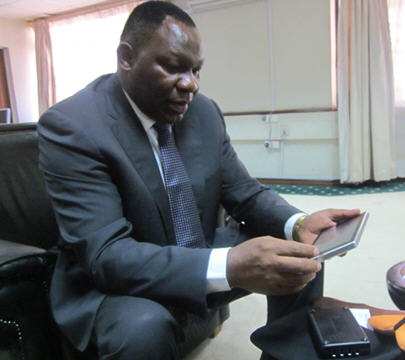by Larry Magid

With an average salary of under $800 a year, Kenya is ranked near the bottom when it comes to per capita income. But, if Bitange Ndemo has his way, the country will use technology as its ladder to prosperity.
Ndemo, permanent secretary of the country’s Ministry of Information and Communications, is optimistic that Kenya’s relatively well-educated — it has a 92 percent literacy rate — and English-speaking population will leapfrog 20th-century technologies and cash in on mobile broadband.
“A few years ago we started to think about how to absorb many youth,” Ndemo told me in a recent interview at his office in Nairobi, adding that half the population is below age 20.
While most Kenyans work in agriculture, information technology is key to the government’s plan to transform the nation from an agrarian to a service-based economy. That includes call centers, software development and light industry.
In 2007, the government drafted what it calls “Vision 2030,” a plan that includes greater government transparency and accountability as well as economic, social and political reforms. To that end, Kenya is launching “open data” websites to make government data “accessible to the people.”
In partnership with the World Bank and Nokia, the country has created an “m-lab” to incubate mobile application startups. In June, m-lab sponsored a mobile apps developers conference and a contest that recognized 25 East African app developers, including Simba Technologies, which created an app called MedKenya that delivers heath information to Kenyans via mobile phone, using information from the government’s open data project. Last month the company participated in DEMO Fall 2011 in Silicon Valley, where it showed off an expanded version, called MedAfrica, to bring similar content to other countries on the continent.
Perhaps the most famous mobile success is M-Pesa (“M” stands for mobile and “pesa” is Swahili for money). Launched in 2007 by Kenya mobile carrier Safaricom, M-Pesa allows people to use text messaging to transfer funds via cell phone. Stores selling cards to top off M-Pesa accounts are everywhere. I even spotted them in small towns while traveling in rural parts of the country.
“Africa is the Silicon Valley of banking,” said Carol Realini, executive chairman of Obopay, a Redwood City-based mobile banking company. “The future of banking is being defined there.”
Ndemo said that there are thousands of young Kenyans involved in app development. One Kenyan company, Planet Rackus, has done well with its “Ma3Racer” driving game that the Kenya Standard newspaper said “allows one to test his or her driving skills on the busiest, and roughest Nairobi roads.” The app, I’m told, is based on racing matatus (taxi vans) on real urban roads. Just inching along Nairobi’s incredibly crowded streets in taxis has been tough on me.
Some rural communities lack electricity, let alone Internet. Although there are projects to bring fiber to the home, most Kenyans get online either at cybercafes or by purchasing an inexpensive USB modem and buying mobile Internet top-off cards.
Fortunately, my laptop has a pretty good battery, which was needed because hardly a day passed during my stay without a brief power outage — even at a luxury hotel in the capital. A lodge I visited in the Masai Mara game reserve uses generators, which they turn off late at night. But Kenya has an abundance of sunshine, and Ndemo hopes to see widespread adoption of solar power. Last year, the country lowered the import tax on solar equipment in an effort to promote “green energy.”
As for the short-term future, one corner of Ndemo’s spacious office is dedicated to a scale model of Konza City, a planned 5,000-acre technology park to be located about 40 miles from Nairobi. The area, already nicknamed “Silicon Savannah,” will eventually feature housing, a science park, a university campus and two “BPO Technology Parks.” BPO stands for business process outsourcing, which can include a variety of “back office” functions including accounting and human resources.
I don’t know how long it will take for Kenya to achieve a modicum of prosperity, but after spending 10 days with some marvelous people, I’m convinced they’ll get there.
Be the first to comment